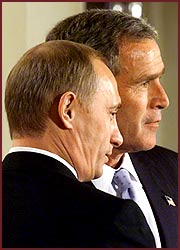Putin determined to argue with Bush during Russia-USA summit in Bratislava
It stands the reason that George W. Bush's questions to Vladimir Putin will not be very pleasant

Vladimir Putin and George W. Bush are to meet in the capital of Slovakia, Bratislava, today on February 24th. “We are not going to a restaurant or a theater. This meeting is not just for the pleasure of communication,” the Russian president described his expectations of the summit with George W. Bush. 
Vladimir Putin traditionally gives interviews to accepting country's media outlets prior to every visit. The tradition has been observed this time too. Russian president's statements were meant to George W. Bush, not to Slovakia. In the interview Putin was talking about Russia's vision of democracy, as well as about the nation's relations with the USA, NATO and the CIS. Slovakia is not really interested in those issues: Putin simply wanted to exclude them from the agenda of the Bratislava summit.
”I do not think that it will be something remarkable. Nevertheless, it is an important event for me, because we have a lot of work to do with the USA, both in the economic field and in terms of the international security,” Putin said. One may say that the Russian president indirectly agreed with the general assumption of the summit, which said that it would not end with grand changes in the relations between the two countries.
It stands the reason that George W. Bush's questions to Vladimir Putin will not be very pleasant. The Russian president was asked, if he was going to remind the US president of Iraq, Abu Ghraib or Guantanamo. “A question in return and even a debate is not excluded,” Putin said. The Russian president believes that Russia and the USA should turn over controversial pages of their relations, especially as far as the Iraqi problem is concerned.
Putin confirmed that he was ready to talk about the state of democracy in Russia. “Fundamental principles of democracy, institutes of democracy should be adapted to the reality of the up-to-date life in Russia, to our traditions and history. We will do that ourselves,” Putin stated. When Russia chose democracy, it did not wish to please anyone at all. The choice was made only for Russia itself, Putin believes. According to Putin, Russia would be happy to welcome benevolent criticism, for it will be very helpful for the country.
Putin tried to stand for his right to ask cross-questions to Bush. “I would like to pay your attention to the fact that the countries with so-called developed democracy experience a lot of problems with democracy. When we point out such problems in Western countries during friendly conversations, our partners have the following to say even to obvious matters and criticism: “There are problems, we understand, but it just so happened with us. Everybody is used to it, one should not change anything,” the Russian president said.
Vladimir Putin is intended not only to answer, but to ask questions too. In addition, the Russian president believes that it would be preferable to discuss such delicate issues as the state of democracy in friendly conversations.
Putin is prepared for the “dialogue of the friends” in Bratislava. “However, we are against using these issues as an instrument for achieving foreign political goals,” said he.
The Russian president does not think that the anti-terrorist struggle has stopped being the “universal glue,” which was fixing the relations between Russia and the USA after 9/11 terrorist attacks. The anti-terrorist struggle is far from being the only field, in which Russia and the USA are ready to share responsibilities. According to Putin, the non-proliferation issue is highly important too, although the issue implies the problem with Iran. The Russian president emphasized that Russia was not going to join NATO: that would mean a partial loss of the national sovereignty and certain restrictions in making political decisions.
Putin also touched upon several questions, which were not included in any previous US-Russian summit, particularly about Moscow's attitude to the change of elite in the CIS and the toughening geopolitical competition at this point. “I am deeply concerned about the fact that those changes go outside the law and the Constitution,” Putin said. The president was obviously talking about the current situation with Ukraine. Apparently, the Russian administration has not been able to completely make up with acknowledging Viktor Yushchenko the legitimate President of Ukraine. As far as the issue of changing leaders is concerned, Putin said that it was not the most important subject for Russia, although one could see that it was disturbing Putin too: “This problem does not make us either hot or cold, like we say in Russia. It is up to people of those countries to decide, which way to choose for building democracy – by law or revolution,” Putin said. As far as the geopolitical competition in the CIS is concerned, the president does not think that it will bring any success to Russia's rivals: “If Russia introduces democratic principles in post-Soviet states, as someone believes so, what is the point of revolutions then?”
Subscribe to Pravda.Ru Telegram channel, Facebook, RSS!


